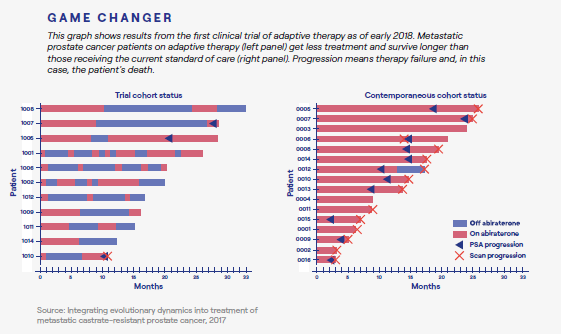This article was published in TSE science magazine, TSE Mag. It is part of the Autumn 2024 issue, dedicated to health. Discover the full PDF here and email us for a printed copy or your feedback on the mag, there.
In the war on cancer, humanity suffers heavy losses. But the tide may be turning thanks to new interdisciplinary research, including the work of TSE economists. Péter Bayer is taking game theory into battle against this shape-shifting destroyer, helping doctors to marshal their forces and save lives.
WHY IS CANCER SUCH AN ELUSIVE OPPONENT?
Cancer differs from most other diseases in that your own rapidly mutating cells are making you ill. Chemotherapy drugs can destroy the cancer cells, but they also kill fast-dividing normal cells, leading to painful side effects. The maximum tolerated dose (MTD) is usually given to kill as many cancer cells as possible without causing unacceptable harm to the patient.
Unfortunately, cancer’s fast mutation makes it very resilient. If a treatment damages it a little, it can build itself back up the same way; if treatment damages it a lot, it may rebuild itself completely differently and become resistant. Adapting quickly to different threats, cancer’s mutations can, for instance, allow it to ‘hide’ from or ‘fight back’ against the body’s immune system.
Once cancer becomes metastatic, spreading to vital organs, it tends to be fatal. The first few MTD doses often work for a while, before resistance kicks in. Every successive type of drug tends to have the same outcome, until the patient dies.
HOW CAN GAME THEORY COME TO THE RESCUE?
As an economist, I use game theory (see below) to anticipate how cancer will respond to treatment. Therapy-sensitive cancer cells, resistant, and normal cells can be seen as ‘players’ interacting in a complex ecosystem. Flooding this environment with chemotherapy will wreak havoc on sensitive cells, but it also allows resistant cells to multiply without competition. In immunotherapy, drugs that target ‘hiders’ clear the way for ‘fighters’, and vice versa. Analyzing such games can identify the best treatment for each situation.
Inspired by game theory, adaptive therapy uses lower doses to try to manage the cancer and turn it into a chronic disease, rather than using MTD until all cancer cells are exterminated or the patient dies. Chemo drugs are expensive and toxic to patients, so this approach could save valuable resources, reduce suffering, and lengthen lives, as well as inspiring future medical advances and paradigm shifts about cancer treatment.
Even if we stick to the goal of eradication, game theory can be a game changer. Today’s standard of care is to only switch medication once it stops working and cancer is fully resistant to it. However, one of game theory’s main lessons is to keep changing the environment before cancer can adapt. By introducing a new drug only when the tumor has evolved a defense, the physician unwittingly helps cancer adapt. New research suggests these drugs can be more effective if applied together or in quick succession.
Game theory is the mathematical tool for studying situations in which participants can impact each other’s success. Players might be individuals, corporations, cancer cells, or computers; strategies represent their actions or the traits they are born with; payoffs could represent profit, happiness, or reproductive success.





